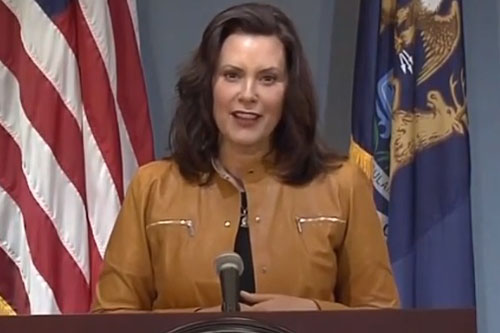by WorldTribune Staff, October 4, 2020
Michigan Democrat Gov. Gretchen Whitmer said that her coronavirus lockdown orders will remain in place for 21 days after the Michigan Supreme Court on Friday ruled her current orders unconstitutional.
The governor has 21 days to request a rehearing of the ruling from the Michigan Supreme Court.

Whitmer insists that her emergency powers remain in effect and enforceable until those 21 days have passed.
“It is important to note that this ruling does not take effect for at least 21 days, and until then, my emergency declaration and orders retain the force of law,” Whitmer said in a press release.
A Republican member of the State Board of Education said Whitmer’s stance is grounds for impeachment.
“The governor does not get to continue to violate the state constitution and the rights of 10 million residents for another 21 days,” Tom McMillin, a former state representative and current member of the state’s education board, said on Saturday. “Our Supreme Court said that her edicts were illegal after April. And that is from our state’s highest court — there is nowhere to appeal yesterday’s decision.”
McMillin continued: “Gov. Whitmer swore to uphold the state constitution. For her to now claim that she can continue to violate it for another 21 days seems to me to be pretty clear grounds for impeachment, especially given the very broad reach of her illegal and numerous executive orders.”
Whitmer has vowed to continue her lockdown orders, asserting that she possesses “alternative sources of authority” that were not at issue in the state supreme court’s ruling. She did not say what those sources were, but reports say they could involve rules from the Michigan Department of Health and Human Services, as well as from local health departments.
The state’s high court said in a 4-3 ruling that a state law allowing the governor to declare emergencies and keep them in place without legislative input — the 1945 Emergency Powers of the Governor Act — is unconstitutional.
The court was unanimous in ruling that a separate law — the 1976 Emergency Management Act — did not give Whitmer the power, after April 30, to issue or renew any executive orders related to the coronavirus pandemic after 28 days without the legislature’s approval.
The Mackinac Center for Public Policy, which brought the suit in federal court that led to Friday’s ruling, argued the decision ends Whitmer’s executive orders immediately, or, at the very least, as soon as a federal judge uses the ruling to decide the center’s case.
“It’s a matter of when we can get a court to implement it,” said Patrick Wright, vice president for legal affairs at the Mackinac Center. “Anybody that is in the courts right now will point to this ruling and should win.”
The court gave a long list of businesses that were forced to be shuttered under Whitmer’s mandates, including:
Restaurants, food courts, cafes, coffeehouses, bars, taverns, brew pubs, breweries, microbreweries, distilleries, wineries, tasting rooms, clubs, hookah bars, cigar bars, vaping lounges, barbershops, hair salons, nail salons, tanning salons, tattoo parlors, schools, churches, theaters, cinemas, libraries, museums, gymnasiums, fitness centers, public swimming pools, recreation centers, indoor sports facilities, indoor exercise facilities, exercise studios, spas, casinos, and racetracks.
Less than two hours before the Michigan Supreme Court declared her lockdown orders unconstitutional, Whitmer imposed tighter restrictions on the state’s Upper Peninsula, which has seen an increase in the number of covid cases reported. The Democrat governor has issued nearly 200 executive orders since the covid crisis began in March.
Officials with the Department of Justice, which had raised concerns about Whitmer’s lockdown orders, said the court’s ruling on Friday was a victory for the rule of law.
“The United States Constitution guarantees a republican form of government to every state in our free country. The Constitution does not permit any public official unlawfully to restrict our liberty,” Assistant Attorney General Eric Dreiband of the Civil Rights Division said in a statement. “All public officials must respect the right of the people to govern themselves at all times, especially during a crisis.”
Intelligence Brief __________ Replace The Media
